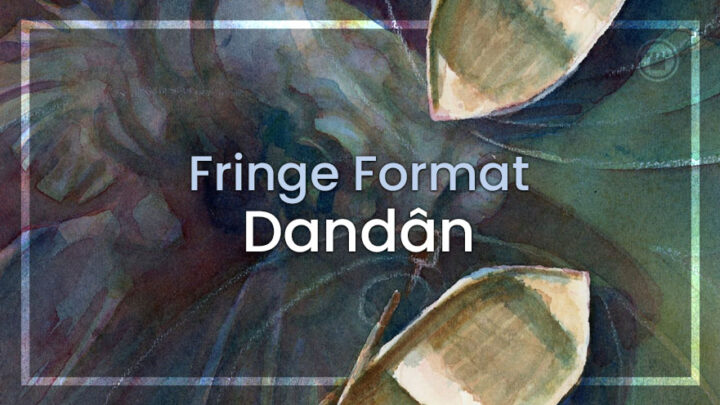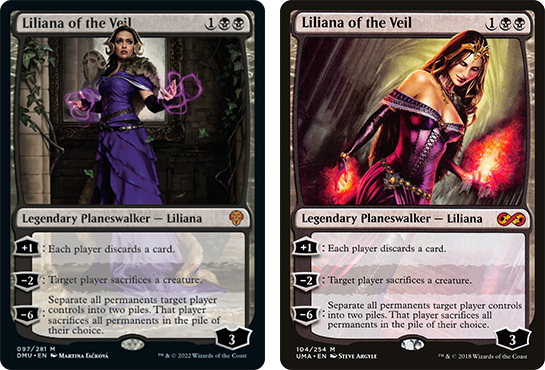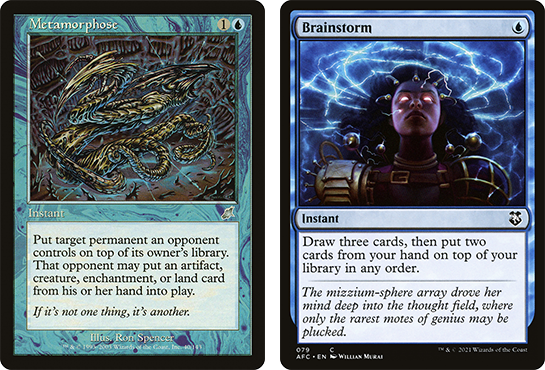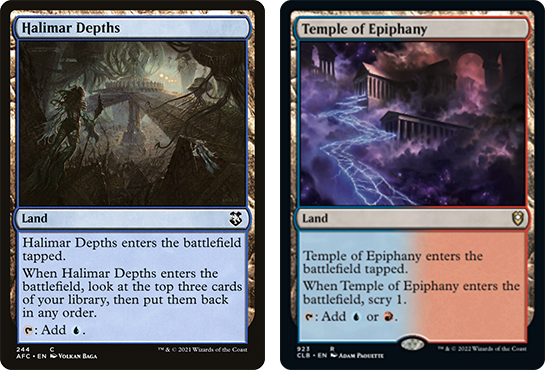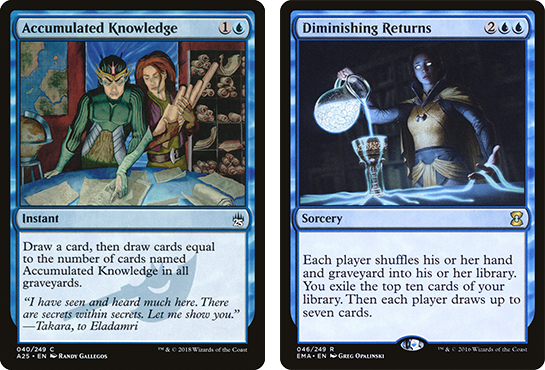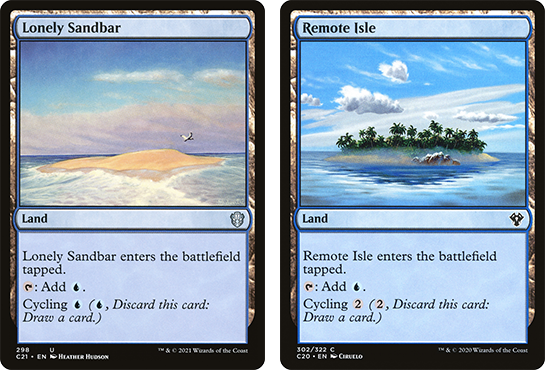Some fringe formats thrive off individual expression, or playing the most powerful cards in Magic, or both. Anyway, here’s Chris with Dandân.
Many fringe formats of Magic center around either a creature with evocative abilities and lore (Momir Vig) or a group of linked creatures so emblematic of an aspect of the game that they can’t be ignored (The Elder Dragons). Commander is a format grown out of the original Elder Dragon Highlander that entirely hinges on unique creatures at the lead of your deck, and Oathbreaker extends that to Planeswalkers – in all cases, legendary and singular cards form the heart of these formats,
Anyway, here’s Dandân:
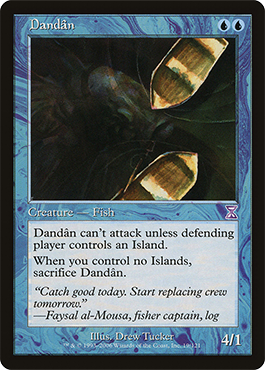
Not exactly a card that seems to scream for an entirely new format to be formed around it, does it? And yet, this article exists, so obviously someone, somewhere thought this strange, lopsided fish with two downsides was the bee’s knees. Specifically, Nick Floyd, who created the format that he originally called Forgetful Fish.
So what is this strange format? Why this creature in particular? Let’s take a look at how this works.
The Basics
Dandân is played between two players who share a single 80-card deck…and here it is!
Decklist – 80 Cards
10 Dandân
8 Memory Lapse
4 Accumulated Knowledge
2 Brainstorm
2 Crystal Spray
2 Dance of the Skywise
2 Diminishing Returns
2 Metamorphose
2 Mind Bend
2 Mystical Tutor
2 Mystic Retrieval
2 Predict
2 Ray of Command
2 Supplant Form
2 Unsubstantiate
2 Vision Charm
2 Izzet Boilerworks
2 Lonely Sandbar
2 Halimar Depths
2 Remote Isle
2 Svyelunite Temple
2 Temple of Epiphany
20 Island (yes, I am being a little cheeky with that link)
Already, a few things stick out. 10 copies of the namesake fish, 8 Memory Lapses, 4 Accumulated Knowledges, and 2 of everything else. All of which will cost you less than a couple Lilianas of the Veil, depending on which version of the card you get. Making this a pretty affordable format to get into, but I digress.
As mentioned, players share a deck, and also share a graveyard. When mulliganing, if you reveal a hand with less than two lands, you can mulligan for free (as in, you don’t go down a card at the start of the game). Other than that, everything else works like a normal game of two-player Magic; you both start with 20 life, play one land a turn, use normal timing restrictions, and win by either hitting your opponent down to zero or milling them out. But both of those win conditions get a little more interesting to accomplish in Dandân. First, we’ll look at damage.
The Cards
Dandân is the only way the deck has to actually deal damage. Dandân’s first ability (also known as Islandhome), is a pretty big drawback normally, but with 20 Islands and only 12 of any other land in the deck, it seems likely that both players will end up with Islands sooner or later. And yet, the deck has some shenanigans built into it to mess with this. Izzet Boilerworks can bounce an Island back to your hand, of course, but things get way trickier than that. Crystal Spray, Vision Charm, and Mind Bend all act as removal spells, as changing Island into Forest (or whichever other Basic Land type you prefer) in Dandân’s text suddenly makes that second clause on the creature take effect. Dance of the Skywise can save a Dandân from this happening, and/or be used let a Dandân fly over opposing fish for a turn.
You can also engage in a different form of shenanigannery with cards like Ray of Command and Supplant Form. Neither are a permanent solution to a resolved Dandân, although Supplant Form is close. Unsubstantiate can also give you a bit of a tempo swing, but it might end up being better used as more of a temporary counterspell rather than bouncing a Dandân. Metamorphose is even better, as putting a creature on top of a shared library means that you can set it up to where you get to draw that creature yourself, making the card a delayed two-for-one. Kind of. Potentially. Since your opponent is able to put a permanent (yes, technically not Planeswalkers, but those don’t exist in this format) from their hand into play, so if they have another Dandân waiting in the wings they get to rebuild instantly.
Which brings us to the second win condition, and the place where Dandân truly gets brain-busting: Mill, and controlling the top of the library. Since the library is shared, cards like Brainstorm, Predict, and Mystical Tutor get way more complicated than normal, as you are now having to take what you might be leaving for your opponent into account. Halimar Depths and Temple of Epiphany also become way more interesting than normal, as they also let you control your opponent’s draw step for a turn.
Even the fact that the graveyard is shared means that Accumulated Knowledge becomes a bit of its own game of chicken, as if you cast one you could be powering up another one in your opponent’s hand. Diminishing Returns can rest the clock of a game that seems close to milling out, but those returns are…well, they’re diminishing. Well named card, that one.
But back to milling. You’d think milling would be odd since you work off a shared library, but the wording of the rules around a mill win fixes that: if you would draw off an empty library, you lose. So, whoever would be the first to draw off a completely milled shared library is the one who will lose.
Now, Dandân is a grindy format. While Dandân (the fish) itself does have four power and can end the game pretty quick in multiples, winning through damage is actually tricky, as there’s all kinds of hindrances and stalling tactics. Given that, a lot of games come down to mill, which brings up the strategic importance of Memory Lapse.
Anyone who has ever played against Memory Lapse before can tell you that the card, when deployed strategically, is much more powerful and annoying than it might seem on first glance. In a format with a shared library, Memory Lapse is backbreakingly powerful. Not only do you counter an opponent’s spell, but you can also effectively steal it, as it goes on top of the library for you to draw next turn) assuming you’re countering something on their turn). There’s enough instant-speed draw in the format, however, to make this a somewhat interesting proposition.
But where Memory Lapse gets real funny is when the library is down to the last few cards. Adding a single card to the library flips who will eventually win, so you will absolutely run into situations where you want to counter your own spell, effectively giving it to your opponent but changing the math on who draws what when. This is also the time when Lonely Sandbar and Remote Isle can truly shine; Cycling lands are always a decent value proposition but using one to draw out the last card from under your opponent brings them to a whole new level.
A Fishy Format
So that’s Dandân, the fish and the format. It’s an odd one, more grindy and brain melting than one might think at first glance. This is definitely the sort of thing that appeals to a certain type of player (by which I mean ones who already think Islands are probably the best card in Magic), but I’d suggest giving it a shot if you have a chance. It definitely makes you think about things differently than normal, and expanding your perspective is something I’m on record already as saying will make you a better Magic player over time. Plus, it absolutely shows off the fact that even the most middle-to-low tier cards can find a home somewhere, and be kind of nuts in that home. I, for one, never thought I’d have to contemplate Mind Bend as much as I have in the last week or so.
Also, again, this is a very affordable format, as only one person needs to have the requisite cards to be able to play. I think I know a place that can help you with that part.
It’s…I mean it’s Card Kingdom, that’s the place. Go there please. Thank you.

Chris is the Marketing Communications Coordinator (and editor of the blog) at Card Kingdom. He would like to apologize to his son for not holding onto more cards from when he first started playing, as that likely would have paid for college. He enjoys pretty much all formats of Magic, but usually ends up playing decks that make other people dislike playing those formats with him.

